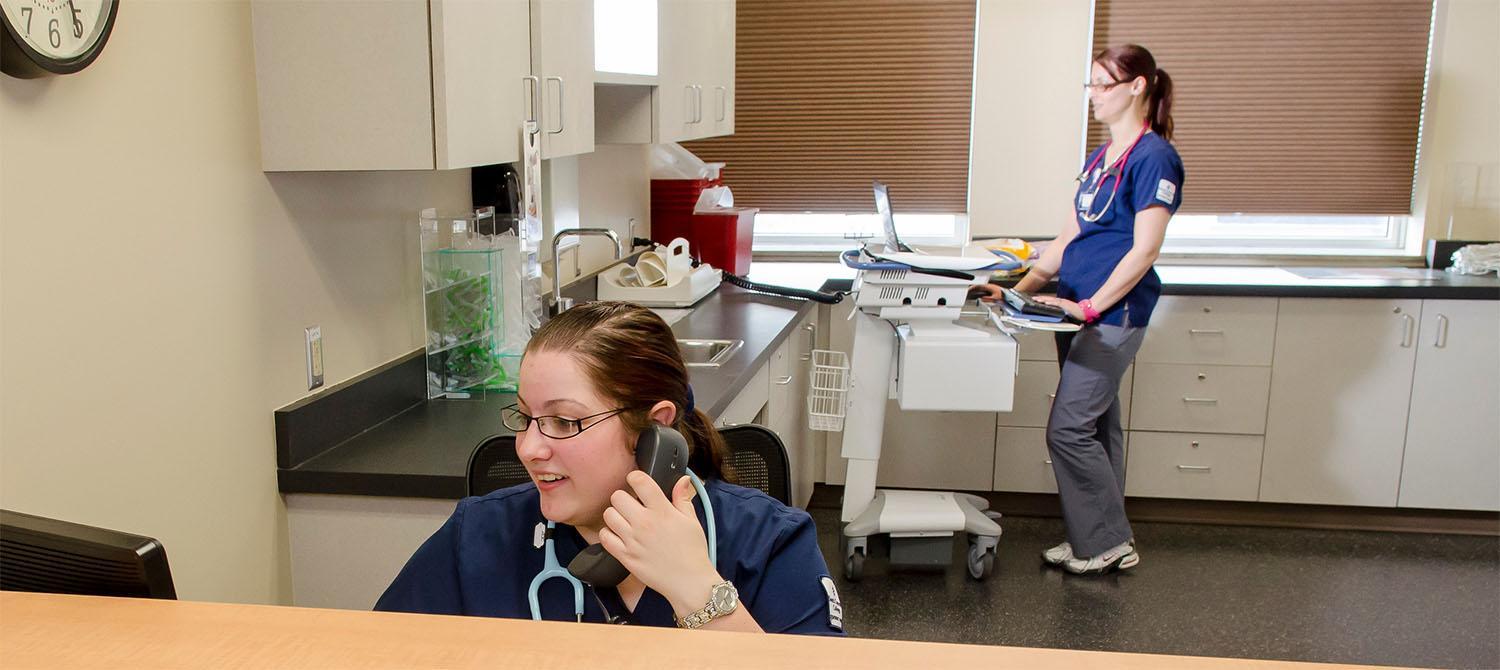

Featured
What Are Health Professions
Published: September 15, 2023
Discover the various health professions available in the healthcare field. Learn about the featured careers and find out how to pursue a rewarding profession in healthcare.
Introduction
Health professions play a vital role in society, ensuring the well-being and care of individuals in various healthcare settings. From doctors to nurses, therapists to technicians, these professionals work tirelessly to diagnose, treat, and support patients’ physical and mental health needs. With the growing emphasis on healthcare and the demand for skilled professionals, health professions offer promising career opportunities with the potential for personal fulfillment and professional growth.
Health professions encompass a wide range of occupations, each with its own unique set of skills, responsibilities, and educational requirements. Whether it’s direct patient care, research, administration, or technology-driven roles, these professionals contribute to the healthcare industry’s overall efficiency and effectiveness. Understanding the significance of health professions and the diverse career paths available can inspire individuals to pursue a rewarding and impactful career in healthcare.
This article aims to explore the different types of health professions, the education and training requirements, job outlook, and the rewards and challenges associated with these careers. By delving into the world of health professions, readers will gain valuable insights into how these professionals make a difference in people’s lives and the opportunities that await those pursuing a career in the field.
Definition of Health Professions
Health professions refer to a wide array of occupations within the healthcare industry that focus on diagnosing, preventing, and treating illnesses, injuries, and various health conditions. These professions encompass a range of roles, from doctors and nurses to technicians and therapists, all working together to provide comprehensive and quality care to individuals of all ages and backgrounds.
Health professionals are instrumental in promoting and maintaining the well-being of patients, whether through direct patient care, research, education, or support services. They possess the necessary knowledge, skills, and expertise to assess, diagnose, and treat medical conditions, and play a crucial role in healthcare delivery systems.
The main objective of health professions is to enhance people’s physical, mental, and social health, allowing individuals to lead healthy and fulfilling lives. These professionals work in various settings such as hospitals, clinics, rehabilitation centers, research institutes, and community health organizations. Their roles may include providing direct patient care, conducting diagnostic tests, developing treatment plans, administering therapies, managing healthcare facilities, and advocating for patient rights and well-being.
Health professions are characterized by a commitment to upholding ethical standards, compassionate care, continuous learning, and collaboration with interdisciplinary teams. These professionals work in a multidisciplinary environment, collaborating with other healthcare providers to provide holistic care and improve patient outcomes.
It is important to note that health professions are governed by regulatory bodies and professional organizations that establish and enforce standards of practice and ethical conduct. These regulatory bodies ensure that health professionals meet the required qualifications, maintain ongoing professional development, and adhere to specific codes of ethics, ensuring the provision of safe and effective healthcare services.
Overall, health professions are the backbone of the healthcare industry, covering a wide range of occupations that are essential in maintaining and promoting individuals’ health and well-being. Through their expertise and dedication, health professionals make a significant impact on people’s lives, providing critical care and support during times of illness or injury.
Importance of Health Professions
Health professions play a crucial role in society by ensuring the optimal health and wellness of individuals and communities. These professionals are instrumental in preventing and treating illnesses, promoting healthy behaviors, and improving overall quality of life. Here are some key reasons why health professions are of utmost importance:
- Healthcare Delivery: Health professions are at the forefront of healthcare delivery, providing essential services and care to patients. They work across various healthcare settings, such as hospitals, clinics, and rehabilitation centers, to diagnose, treat, and manage a wide range of health conditions.
- Disease Prevention and Health Promotion: Health professionals play a vital role in preventing diseases and promoting healthy behaviors. They educate individuals and communities about the importance of preventive screenings, vaccinations, and adopting healthy lifestyle choices, such as proper nutrition, regular exercise, and stress management.
- Improved Patient Outcomes: Through their expertise and specialized knowledge, health professionals contribute to improving patient outcomes. They work to diagnose diseases, develop personalized treatment plans, and provide ongoing care to individuals, ensuring that they receive the appropriate interventions and therapies to promote recovery and well-being.
- Public Health: Health professions have a significant impact on public health initiatives. They collaborate with public health organizations to develop strategies for disease prevention, conduct research studies, analyze health data, and advocate for policies that promote the well-being of communities at large.
- Supporting Well-being: Health professionals not only focus on physical health but also address mental, emotional, and social well-being. They provide counseling, therapy, and support services to individuals and families dealing with mental health issues, addiction, disabilities, and other psychosocial challenges.
Moreover, health professions contribute to the overall functioning of healthcare systems. They work in interdisciplinary teams, collaborating with other healthcare professionals to ensure the delivery of high-quality and coordinated care. By fostering teamwork, communication, and shared decision-making, health professionals enhance the efficiency and effectiveness of healthcare services.
Furthermore, health professions are essential for addressing healthcare disparities and promoting health equity. They strive to provide accessible and culturally sensitive care to individuals from diverse backgrounds, ensuring that everyone has equal access to quality healthcare services.
In summary, health professions are of utmost importance as they are responsible for the delivery of healthcare services, disease prevention, promoting healthy behaviors, improving patient outcomes, supporting well-being, and contributing to public health initiatives. These professionals make a significant impact on individuals and communities, ensuring that everyone has the opportunity to live a healthy and fulfilling life.
Types of Health Professions
Health professions encompass a wide range of occupations, each with its unique role in providing care and support to patients. These professions require specialized knowledge, skills, and expertise in their respective fields. Here are some common types of health professions:
- Doctors: Doctors, also known as physicians or medical doctors, are responsible for diagnosing and treating various medical conditions. They specialize in different areas such as primary care, surgery, pediatrics, cardiology, neurology, and many more.
- Nurses: Nurses play a pivotal role in providing direct patient care and supporting the overall healthcare team. They administer medications, monitor patients’ conditions, perform treatments, educate patients and families, and advocate for their well-being.
- Therapists: Therapists specialize in different areas to help patients recover from injuries, manage pain, and improve their overall function and well-being. Physical therapists focus on restoring movement and mobility, occupational therapists assist with daily living skills, and speech therapists help with communication and swallowing difficulties.
- Technicians: Technicians work in various areas of healthcare, conducting various diagnostic tests and procedures. Examples of technicians include radiology technicians, laboratory technicians, pharmacy technicians, and surgical technicians.
- Pharmacists: Pharmacists are medication experts responsible for dispensing medications, counseling patients on their proper use, and ensuring the safe and effective use of medications.
- Dentists: Dentists are responsible for oral health, focusing on diagnosing, treating, and preventing dental conditions. They perform procedures such as cleanings, fillings, extractions, and root canals.
- Mental Health Professionals: Mental health professionals include psychiatrists, psychologists, and counselors who specialize in assessing, diagnosing, and treating mental health disorders. They provide therapy, counseling, and medication management to individuals and families.
- Administrative and Support Staff: Health professions also include administrative and support roles that are essential in the smooth functioning of healthcare organizations. These roles include medical assistants, medical office administrators, healthcare administrators, and medical coders and billers.
These are just a few examples of the various types of health professions available. Each profession requires a specific set of skills and qualifications, and individuals may choose to specialize in a particular area based on their interests and goals. It is important to note that health professions continue to evolve, with new roles emerging to meet the changing needs of healthcare.
Ultimately, the diverse range of health professions ensures that patients receive comprehensive care across different aspects of their health, enabling them to achieve optimal well-being.
Education and Training Requirements for Health Professions
Health professions require a solid educational foundation and specialized training to ensure practitioners have the necessary skills and knowledge to provide effective care. The education and training requirements vary depending on the specific profession and specialization. Here is an overview of the general educational pathways for health professions:
- Undergraduate Education: Most health professions require a bachelor’s degree as a minimum educational requirement. Students pursuing a career in healthcare typically choose a relevant major such as biology, chemistry, nursing, or psychology. Some professions may offer specific undergraduate programs or pre-professional tracks to prepare students for further education in the field.
- Professional Degree Programs: After completing a bachelor’s degree, many health professions require individuals to enroll in a professional degree program. These programs are specific to each profession and provide in-depth education and training in the specific field. Examples of professional degree programs include medical school for doctors, nursing programs for nurses, dental school for dentists, and pharmacy school for pharmacists.
- Clinical Training and Residency: Certain health professions, such as doctors and dentists, require completion of a clinical training program or residency after obtaining a professional degree. This hands-on training allows individuals to apply their knowledge in real healthcare settings, working under the guidance and supervision of experienced professionals.
- Licensure and Certification: Many health professions require licensure or certification to practice. Licensure requirements typically involve passing a national examination and meeting specific education and experience criteria. In addition to licensure, some professions may also offer certifications in specialized areas to demonstrate expertise.
- Continuing Education: Health professions often require individuals to engage in ongoing professional development to stay current with advancements in their respective fields. This may involve attending conferences, completing continuing education courses, or participating in research or clinical updates.
It is important to note that the duration and requirements for education and training can vary significantly depending on the profession. For example, becoming a doctor typically involves around 8-10 years of post-secondary education, including medical school and residency, while becoming a nurse may require a bachelor’s degree in nursing or an associate degree in nursing and passing the national licensing examination (NCLEX-RN).
Moreover, some health professions offer opportunities for specialization through additional education and training. This allows professionals to develop expertise in specific areas such as pediatric nursing, orthopedic surgery, psychiatric therapy, or clinical research.
Overall, education and training are vital components of health professions, ensuring that practitioners are well-prepared to meet the complex challenges of healthcare and provide the highest quality care to patients.
Job Outlook and Salary
The job outlook for health professions is generally positive, driven by factors such as population growth, an aging population, advancements in healthcare technology, and increased emphasis on preventive care. As a result, there is a growing demand for healthcare professionals across various specialties. Here is an overview of the job outlook and salary potential for health professions:
- Projected Job Growth: According to the U.S. Bureau of Labor Statistics (BLS), employment in healthcare occupations is projected to grow much faster than the average for all occupations. This growth is expected to add millions of new jobs to the healthcare industry over the next decade. The demand for healthcare services is driven by the need to treat chronic conditions, the increasing number of older adults requiring medical care, and the growing awareness of preventive healthcare.
- Hot Job Opportunities: Certain health professions are projected to experience particularly high demand. For example, the demand for registered nurses is expected to grow significantly due to the increasing need for healthcare services, including in-home care, long-term care facilities, and hospitals. Other professions with promising job prospects include physician assistants, physical therapists, medical and health services managers, and occupational therapists.
- Salary Potential: Salaries for health professions can vary depending on factors such as experience, education, specialization, geographic location, and the specific industry or healthcare setting. Generally, healthcare professionals earn competitive salaries commensurate with their skills and expertise. Physicians, surgeons, and dentists tend to have the highest earning potential, followed by physician assistants, nurse practitioners, pharmacists, and healthcare administrators. Nurses, therapists, and technicians also have earning potential that can increase with experience and specialization.
- Job Satisfaction: Beyond salary potential, health professions often offer high levels of job satisfaction due to the opportunity to make a positive impact on people’s lives. The ability to help others, contribute to the well-being of individuals and communities, and the ongoing professional growth and development opportunities can make health professions fulfilling and rewarding career choices.
It is important to research and stay updated on the specific job outlook and salary trends for the chosen health profession and region. Professional organizations and healthcare workforce reports can provide valuable insights into the current and projected demand for various health professions.
Ultimately, health professions offer promising job prospects and competitive salaries, making them attractive career options for individuals passionate about healthcare and helping others.
Challenges and Rewards of Health Professions
Health professions come with their unique set of challenges and rewards. While these careers provide opportunities to make a positive impact on the lives of others, they also require dedication, resilience, and an ability to navigate various challenges. Here are some key challenges and rewards associated with health professions:
- Challenges: Health professions can be physically and emotionally demanding. Long work hours, high patient volumes, and the need to stay updated with advancements in healthcare can lead to stress and burnout. Healthcare professionals may also face challenging and complex cases, ethical dilemmas, and difficult patient situations that require empathy, professionalism, and effective communication. Additionally, the healthcare industry is constantly evolving, and professionals must adapt to changes in technology, regulations, and healthcare systems.
- Rewards: Despite the challenges, health professions offer immense rewards. The ability to make a positive impact on the lives of individuals and communities can bring a sense of fulfillment and purpose. Seeing patients recover, improve their quality of life, or successfully manage their health conditions can be deeply rewarding. Health professionals often develop strong relationships with patients and their families, becoming trusted allies in their healthcare journeys. Moreover, the continuous learning and professional growth opportunities in health professions allow individuals to expand their knowledge and skills throughout their careers.
- Personal Fulfillment: Health professions provide the opportunity to work in a field that aligns with personal values and passions. Helping others, providing care and support, and making a difference in the lives of individuals can bring a sense of fulfillment and satisfaction. Health professionals often report a strong sense of purpose and pride in their work, knowing that they are contributing to the health and well-being of their patients and communities.
- Career Opportunities: Health professions offer a wide range of career paths and opportunities for advancement. Professionals can specialize in specific areas of interest, such as pediatrics, geriatrics, oncology, or mental health. There are also opportunities to move into leadership and administrative roles, research and academia, or even entrepreneurship within the healthcare industry.
- Respect and Prestige: Health professions are highly respected and valued in society. The knowledge, skills, and expertise possessed by healthcare professionals are often held in high regard. The trust and gratitude received from patients and the community can contribute to a sense of pride and professional recognition.
It is important for individuals pursuing health professions to be aware of the challenges they may encounter and develop strategies for self-care, resilience, and work-life balance. Seeking support from colleagues, engaging in self-care activities, and maintaining a healthy support system can help individuals navigate the challenges and prevent burnout.
In summary, health professions offer both challenges and rewards. While the demands of these careers require dedication and perseverance, the ability to positively impact lives, the personal fulfillment experienced, the career opportunities available, and the respect and prestige associated with health professions make them worthwhile and gratifying career choices.
Conclusion
Health professions play a vital role in ensuring the well-being and care of individuals across various healthcare settings. These professions encompass a diverse range of occupations, each with its own unique responsibilities and requirements. From doctors and nurses to therapists and technicians, health professionals contribute to the delivery of quality healthcare, prevention of diseases, and promotion of overall well-being.
The field of health professions is constantly evolving and offers promising career opportunities. The demand for these professionals continues to grow due to factors such as population growth, an aging population, and advancements in healthcare technology. This growth opens up avenues for individuals looking to pursue a rewarding and impactful career in healthcare.
However, health professions come with their own set of challenges, including long work hours, high patient volumes, ethical dilemmas, and the need to stay abreast of advancements in the field. It is important for individuals considering a career in health professions to be aware of these challenges and develop strategies to maintain personal well-being and prevent burnout.
Despite the challenges, health professions offer immense rewards. The ability to make a positive impact on the lives of individuals, the opportunities for personal fulfillment and professional growth, and the respect and prestige associated with these professions make them highly rewarding choices.
Whether it’s providing direct patient care, conducting research, managing healthcare facilities, or contributing to public health initiatives, health professionals make a significant difference in the lives of patients and communities.
In conclusion, health professions are essential pillars of the healthcare industry, offering promising career prospects and opportunities to promote the health and well-being of individuals. Through their expertise, dedication, and compassion, health professionals play a critical role in ensuring the optimal health and care of people across the globe.









